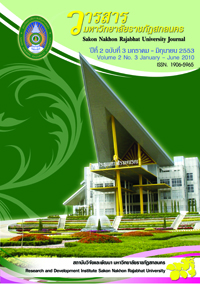การวิจัยปฏิบัติการแบบมีส่วนร่วม เพื่อพัฒนารูปแบบการพัฒนาครู ให้มีความสามารถในการจัดการเรียนรู้ที่เน้นการคิด : กรณีศึกษา โรงเรียนบ้านท่าวัด “คุรุราษฎร์บำรุงวิทย์”
Abstract
บทคัดย่อ
การวิจัยปฏิบัติการแบบมีส่วนร่วมครั้งนี้ มีวัตถุประสงค์หลักเพื่อ 1) พัฒนารูปแบบ การพัฒนาครูให้มีความสามารถในการจัดการเรียนรู้ที่เน้นการคิดและ 2) ศึกษาผลการใช้รูปแบบการพัฒนาครูที่ พัฒนาขึ้น กลุ่มเป้าหมายเป็นครูโรงเรียนบ้านท่าวัด “คุรุราษฎร์บำรุงวิทย์” สังกัดสำนักงานพื้นที่การศึกษา สกลนครเขต 1 ปีการศึกษา 2551 จำนวน 14 คน การดำเนินการวิจัยมี 6 ขั้นตอน ได้แก่ 1) ขั้นเตรียมการ 2) ขั้น ศึกษาปัญหาและกำหนดวิธีการแก้ไข 3) ขั้นวางแผนปฏิบัติการแก้ปัญหา 4) ขั้นวางแผนติดตามและประเมินผล 5) ขั้นปฏิบัติการตามแผนที่วางไว้ และ 6) ขั้นประเมินผลการปฏิบัติการแก้ปัญหา ผลการวิจัย สรุปได้ดังนี้
1. รูปแบบการพัฒนาครูให้มีความสามารถในการจัดการเรียนรู้ที่เน้นการคิด มีองค์ประกอบได้แก่ 1) ชื่อรูปแบบ 2) ความเป็นมาและความสำคัญ 3) แนวคิดพื้นฐาน 4) หลักการ 5) วัตถุประสงค์ 6) เนื้อหา 7) กระบวนการ 8) สื่อและแหล่งเรียนรู้ และ 9) การวัดและประเมินผล โดยแนวคิดพื้นฐานสำคัญมี 3 ประการ คือ การฝึกอบรมอย่างมีส่วนร่วม การฝึกอบรมโดยใช้โรงเรียนเป็นฐาน และการอบรมเพื่อแก้ไขปัญหาการ ปฏิบัติงานแบบครบวงจร
2. ผลการใช้รูปแบบพัฒนาครู พบว่า 1) ก่อนการพัฒนา ครูมีคะแนนเฉลี่ยของความรู้เกี่ยวกับการ จัดการเรียนรู้ที่เน้นการคิดเท่ากับร้อยละ 45.73 แต่หลังการพัฒนามีคะแนนเฉลี่ยสูงขึ้นเป็นร้อยละ 73.93 ซึ่งสูง กว่าก่อนการพัฒนาอย่างมีนัยสำคัญทางสถิติที่ระดับ .01 2) หลังการพัฒนาครูทุกคนมีความสามารถในการจัดทำแผนการจัดการเรียนรู้ที่เน้นการคิดผ่านเกณฑ์ที่กำหนด กล่าวคือ แผนการจัดการเรียนรู้ที่ครูกลุ่มเป้าหมายสร้าง ขึ้น มีความเหมาะสมผ่านเกณฑ์ที่กำหนดไว้ และ 3) หลังการพัฒนา ครูมีความพึงพอใจต่อการใช้รูปแบบการ พัฒนาครูในภาพรวมอยู่ในระดับมากที่สุด
Abstract
The objectives of this participatory action research were (1) to study the state, problem, and need of teachers in the target school concerning development of teachers to be able to manage learning with emphasis on thinking, (2) to develop a model for development of teachers to be able to manage learning with emphasis on thinking, (3) to compare teacher’ knowledge of learning management with emphasis on thinking before and after development, (4) to evaluate teacher’ ability to make a learning plan with emphasis on thinking and (5) to investigate teachers’ satisfaction with implementing the teachers development plan.
The target group were 14 teachers at Ban Tha Wat “Kuru Rat Bumrung Wit” School under the Office of Sakon Nakhon Educational Service Area 1 in academic year 2008. The study consisted of 6 steps: (1) preparation, (2) problem investigation and specifying how to resolve the problem, (3) planning to resolve the problem, (4) following-up and evaluating the results, (5) implementing the plan and (6) evaluating the results of problem solution. The findings can be concluded as follows:
1. Every teacher had a congruent opinion that students’ ability to think was in the unsatisfactory criterion, so teachers should be promoted with ability development. They should be able to manage learning with emphasis on thinking through attending a workshop both in theory and practice. A trainer should be assigned to give some advice. Close and regular supervision, following-up and evaluation should be conducted. A package of learning for review and further learning by themselves should be given. The example of a lesson plan with emphasis on thinking should be prepared and the school library should have books, texts, related research reports. Document for introducing websites should be produced including how to search examples of innovation for learning with emphasis on thinking. Experts in demonstrating instruction with emphasis on thinking in the real situation should be invited. A field trip to a successful school in learning management with emphasis on thinking should be made.
2. The model for development of teachers to be able to manage learning with emphasis on thinking was based on three important basic ideas like participatory training, school-based training, and training for resolving performance problems comprehensively. Components of the model comprised (1) model name, (2) its background and importance, (3) basic theory ideas (4) principle, (5) objectives, (6) content, (7) process, (8) media and sources of learning, and (9) measurement and evaluation.
3. The results of implementing the teacher development model revealed (1) that before the development, teacher had an average score of 45.73% for their knowledge about learning management with emphasis on thinking, whereas after the development they got an average score of 73.93% which was significantly higher than before the development at the .01 level; (2) that after the development every teacher had their ability to make a learning management plan with emphasis on thinking and met the criterion; and (3) that after the development, teachers were satisfied with implementation of the overall teachers development model at the highest level.









